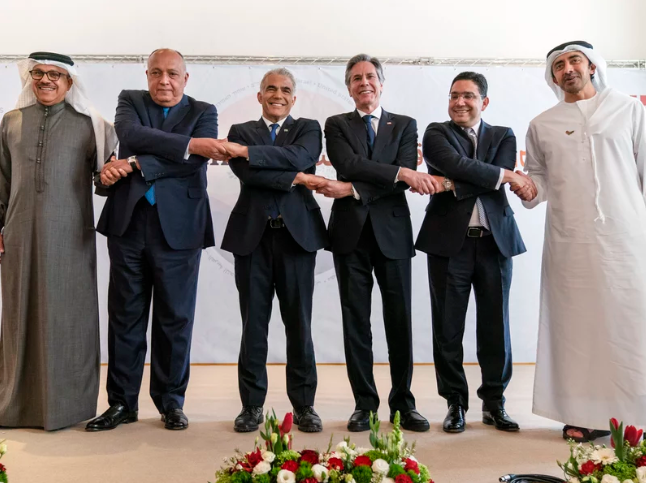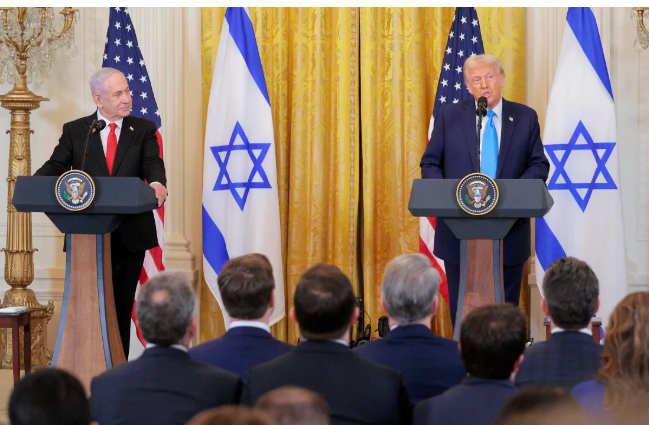The State of The Abraham Accords After 4 Years of Joe Biden & The Transition to The Abraham Alliance

The Trump Administration championed the Abraham Accords framework as a plan to end radicalization and grant the next generation better opportunities.[1]. Peace, security, and prosperity in the Middle East are the core essence of the bilateral agreements that promote the normalization of ties between Israel and other Arab states. In late 2020, Bahrain and the United Arab Emirates announced agreements within the Abraham Accords system. Everyone assumed Donald Trump would win a second term. In this sense, the Abraham Accords were expected to expand to include Saudi Arabia and other major Gulf and Arab states. This was cut short by Joe Biden's win in the 2020 US Presidential election. The purpose of this article is to critically analyze the evolution of the Abraham Accords over the four-year tenure of Joe Biden's presidency.
Biden Administration’s Strategic Approach to the Abraham Accords
When Biden became president, he announced to the world that "America is back ."Whatever that meant was destined to unfold as his presidency unfolded.
The central theme of Biden's White House was "liberal internationalism," in which he believed that international institutions could function as major parameters for the development of states around the globe. This saw Biden adopt a laissez-faire approach to America's engagement in international affairs.
Ultimately, Biden's leadership cusped into a "leading-from-behind" approach, where actors in international relations were allowed to engage without firm American interventions. His opponents widely mocked this strategy as a "sleeping from behind" foreign policy approach.[2].
In contrast with his predecessor, Biden used a relatively weak approach to steering the international political order. President Trump45 pursued a peace-through-strength approach, where America's allies were armed to maintain security within their jurisdictions and regions. Thus, most militant groups were kept under leash. This led to more security and fewer wars between 2017 and 2021.
On the other hand, Biden sought to promote more idealism and encourage the development of international institutions to promote governance. This included attempts to end the maximum pressure on Iran, which created a gap for Iran to expand its international terror network under the so-called Axis of Resistance.
While the Biden Administration supported the expansion of the Abraham Accords, they made normalization between Israel and the Arab States a conditional process premised on the establishment of a Palestinian state. This was part of the Biden morality-driven international engagement plan.
This subjective moral leadership philosophy saw the ostracization of the Saudi monarch for the Jamal Khashoggi case and the placement of limits on Israel's actions concerning the Palestinians.
In hindsight, these morality-driven demands on Israel and other American allies have been overridden by the destabilizing actions of Iran in the region. Iran recently abducted Jamshid Sharmahd, a German-Iranian citizen from Dubai, and executed him under terms no different from the Khashoggi case. However, the Biden Administration could not apply the same high moral standards they used against Saudi Arabia, which created the gap for the Houthis to rise and destabilize the global economy – one of the issues that culminated in the unpopularity of Biden’s handpicked successor in the recent presidential elections.
Thus, many contradictions defined the Biden Administration in handling the Abraham Accords. First, there was an over-optimistic approach used by the Administration in the earliest years to encourage hostile states like Iran. Then, a series of unrealistically high ethical and moral demands was placed on traditional American allies. Finally, the Abraham Accords became conditioned when they were tied to the creation of a Palestinian state – a move Hamas was not ready to accept anyway.
Abraham Accords Before October 7, 2023
In early 2022, the Abraham Accords became popular in Congress, and it gained a bipartisan caucus that backed it in the House and Senate[3]. This means it had the legislative momentum to thrive into the foreseeable future.
Changes were observed at the US government's strategic levels. In late 2021, America's military coordination with Israel shifted from the European Common Command to the Central Command (CENTCOM), which previously oversaw operations in the Middle East.[4] This meant any regional action to protect Israeli interests and assets would be coordinated from the Middle Eastern US military units rather than Europe's strategic ambit.
There were plans to integrate Israeli and Arab air defenses with a common command from Washington[5]. This meant Israel and Arab states would have to coordinate, but in a parallel manner, even if they had no diplomatic ties.
The US government commissioned private research entities, such as the Abraham Accords Peace Institute and the N7 Initiative of the Atlantic Council, to study and provide recommendations.
Saudi Arabia had clear conditions for normalization with Israel. This included the creation of a Palestinian state. Such pointers were seen in the Saudi refusal to allow Israel to use its air space for operations.
However, there was some demur in hearing out the Saudis vis-à-vis their Israeli counterparts. This was linked to the high moral grounds taken by the Biden Administration on the Saudi offensive in Yemen and the Khashoggi affair, which culminated in some seclusion of the Saudi crown prince. In hindsight, this was a strategic gap that came with expensive consequences.
Saudi Arabia took a less definitive position in limiting its relationship with Russia during the Ukraine war. After all, the Saudis were not treated as true US allies in the first few years of Biden's tenure. This culminated in various acts that placed the indirect Saudi negotiations with Israel for a Palestinian state on hold.
It was in this air of uncertainty that the October 7th massacres by Hamas occurred in 2023. Biden's reliability was already in question. However, before that, the 2019 attacks on Saudi oil infrastructure by Iranian proxies in Yemen and elsewhere were not handled extensively by the United States.
Thus, the Saudis needed a guarantee from the United States before agreeing to any negotiations and normalization with Israel. After all, America did next to nothing for Saudi Arabia.
Biden's laxity in confronting Iran and refusal to intervene in conflicts directly raised new questions. One wonders what would have happened in Kuwait in 1991 if Iraq had invaded under Biden's watch in the White House. Biden's lack of will to put "boots on the ground" only confirmed Saudi fears.
Aside from the top-level questions between the Saudi, Israeli, and American governments, the Abraham Accords were widely unpopular in Islamic countries.
Anti-accord populism was huge. While some of this was attributed to Iranian-backed destabilizing agents, normalizing ties with Israel was a handy subject that many radical preachers could capitalize on. This is apparently due to decades of anti-Israel sentiments in the Middle East, North Africa, and most of the Global South.
Thus, the Saudi government and other leading GCC countries had to exercise caution in handling questions relating to normalization with Israel.
Abraham Accords after Gaza War – Diminishing Prospects
Many scholars asserted that the Abraham Accords were premised on the assumption that the Palestinian issue was no longer a serious regional concern[6]. After all, the Palestinian PA had collaborated with Israel for over two decades. Hence, there were no grounds to prevent any sovereign Arab state from recognizing Israel and normalizing ties with them.
Initially, the October 7 war came with sympathy for Israel around the globe. Many nations condemned Hamas' attacks on Israel's Kibbutzim in the Gaza envelope. Some Islamic countries maintained an easy quiet but demanded a ceasefire when Israel started its operations in Gaza. Apparently, they could sense Israel's anger and empathy for the civilians of Gaza. However, they could not openly condemn Hamas due to the populist aftermath that would inevitably result from such a gesture.
When Israel’s actions got forceful, and all Hamas’ alibis were rejected, the Islamic world rose up in protests against Israel’s actions. The victim of October 7 was now cast as an aggressor who was using disproportionate force.
Most people expected Israel to stop at some point for Hamas to normalcy to return. However, Israel’s military pressure and Hamas’ blatant refusal to return hostages or take an amnesty offer limited the level of criticisms state actors could level against Israel as a fellow sovereign state.
Populism took over, and non-senior government officials took anti-Israel positions around the Islamic world.
These populist groups accused Gulf states and their representatives of failing to intervene militarily. They had to balance their local populations' condemnation of Israel with the realistic possible solutions they could gain to restrain Israel.
Israel showed no such restraints.
Israel made it clear from the beginning that they want a Gaza without Hamas at any cost. Thus, the best-case scenario was for Hamas to return the hostages and negotiate an amnesty to leave Gaza for a third country like Algeria.[7].
Former Israeli prime minister Naftali Bennett stated that victory for Israel in the Gaza War for him means:
“Hamas surrendering, raising a white flag, releasing the [hostages] and Israel taking all the Hamas leaders and fighters, putting them on a ship and shipping them away from Gaza, and then we can begin rebuilding a new Gaza."[8]
However, Hamas' demands were unrealistic, and this suggests the war will continue until one side emerges as a clear winner and the other is decimated and forced to surrender. Hamas wanted a total ceasefire and Israel's withdrawal before presenting their own demands – which would include regrouping and taking over the Gaza Strip to return to their founding principles. This includes demanding an end to the state of Israel, the return of all Palestinian prisoners, invoking the right of return for all Palestinian refugees, revenge, and a host of other demands that will constitute an end of Israel as a state entity.
Thus, it is apparent that Israel’s war in Gaza will continue into the foreseeable future.
That leaves little room for normalization between Israel and the Arab states as and how the original Abraham Accords were construed in 2020.
Iran’s position as the common enemy that Israel and the Arab states needed to unite to counter has changed significantly.
Sensing a likely direct war with Israel, Iran has moved to play a survival card by projecting itself as a traditional Islamic protector of the people of Gaza. After the second series of ballistic missiles fired from Iranian soil at Israel in early October 2024, Iran did three things to secure its survival in the face of a future war with Israel:
1. The Ayatollah held a public religious gathering where he gave a sermon reiterating Iran’s role as a traditional protector of Palestinian Muslims as part of a pan-Islamic custom,
2. The Iranian foreign minister was sent to Saudi Arabia to seek a rapprochement with their former Sunni rivals to reduce the threats Iran faced from the west and south of its borders and
3. The Iranian president flew to Russia to seek longer-term military cooperation with Moscow to avoid any future issues.
While the immediate military threat between Iran and its Sunni neighbors has been placated significantly on the altar of a common Islamic heritage, the scars and deep wounds remain. Wars between Saudi-led Sunni states against Iran and among their proxies claimed over 1 million Muslim lives in Syria, Yemen, and Iraq. These memories smolder beneath the smiles and handshakes their foreign ministers exchange on camera.
Everyone knows that a nuclear Iran is not likely to target Israel, which has the capacity to strike back and will most likely strike back when attacked by Iranian nuclear weapons. Thus, the security concerns of Saudi Arabia and the Sunni states remain present and alive.
Saudi Arabia is seeking a long-term security pact with the United States that will guarantee their security in case of future attacks similar to the 2019 attacks by Iranian proxies in Yemen and elsewhere.
A bipartisan consensus will likely approve the Saudi-US security pact during Biden's lame-duck period in the White House. Afterward, Trump will likely consolidate the security agreement into a permanent one. Thus, it is fair to say that Saudi Arabia and Israel will remain firmly entrenched in the United States' geopolitical military and strategic plans in the foreseeable future.
Death of the Abraham Accords
At the moment, normalization between Israel and Saudi Arabia seems to be limited for several reasons, including:
1. The lack of a direct offering by Israel to Saudi Arabia or other Arab states: For 75 years, Israel has remained relatively independent of any connection with her Arab neighbors. With deep differences, it is clear that the two blocs do not need to collaborate directly.
2. The unpopularity of the Gaza War: Israel’s war in Gaza has been presented in some very unpleasant terms in the Middle East. Thus, any government that normalizes ties with Israel is likely to face disproportionate consequences.
3. The centrality of Washington in the Abraham Accords: The original Abraham Accords seemed to be another American initiative meant to broker peace in the Middle East – this time with sustainable elements. Unlike the Two-State solution, which focused on high-level agreements to build separate states, the Abraham Accords sought to trickle down to include the people.
4. Iran is no longer the threat it once was. The Abraham Accords were driven by the growing threats of Iranian-backed destabilization efforts in the Middle East. With an Iranian rapprochement in October 2024, it is apparent that Israel and Saudi Arabia need to unite and fight against a common enemy.
The Way Forward: Preserving the Spirit of the Abraham Accords through a Parallel Alliance – The Abraham Alliance
The realities of the Middle East in November 2024 are very different from what they were a few years ago. While normalization is no longer a vital prerequisite, evidence from the past months shows that the Middle East is set to take a very different form.
Gaza is likely to be emptied of Hamas’ direct influence after the current war ends. A new Palestinian statecraft will be set in motion, and this will involve direct Israeli control over the Palestinian territories.
The Abraham Accords' vision was premised on the notion that Palestinians deserved better. The Accords were launched to promote peace, prosperity, and security.
While normalization might not be in place, the Gulf states can play a unique role in the new Palestinian statecraft: They can underwrite the development of a broad-based governance system for the Palestinian people.
For many years, the Sunni Arab states have criticized the Palestinian Authority for corruption. Hamas, as a political organization, thrived on the notion that the PA was inherently corrupt.
Corruption in most parts of the Global South goes hand-in-hand with elitism and exclusion of significant segments of the population, which ultimately leads to poverty and weak state structures.
We are at a time when Israel can work with the Sunni Arab states to change this. And this can work even if it is done grudgingly with care to avoid Sunni state officials sitting in the same room as Israelis. This will include the following pointers:
1. An Alliance: The Abraham Alliance could function as a brokering point in Washington, where Israelis, Palestinians, and Gulf states can have a common communication point to attain peace, prosperity, and security for the Palestinian people, the Middle East, and the region at large.
2. Development of a Functional Plan towards Palestinian Statecraft: This will have to start with the Saudis or GCC gazetting and recognizing the key structures of Palestinian society—family heads, traditional leaders, religious leaders, technocrats, and political leaders. Once they are recognized, support should be provided directly to these leaders at their respective levels to promote prosperity and development. This will eliminate the artificial poverty that was exploited by groups like Hamas to hold on to power and preach radical ideals that lead to wars.
3. Maintaining Efficient Top-Level Communication: The top leaders of Israel and the GCC countries should be able to gain quick and reliable information to plan and run affairs transparently. As the new Palestinian state evolves, the actions at all levels must be reported for parties to engage through the centralized framework.
4. Exclusion of Militancy: There should be a conscious effort for a universal choice to eliminate and exclude militant groups. This will involve preventing the regrouping of radical groups like Hamas in new Palestinian statecraft.
5. Regular Oversight Report by the Trustees of the Palestinian Statecraft: The region's most successful countries evolved after continuous oversight prior to full governance. Thus, the new trustees of the Palestinian statecraft can and should give quarterly and annual reports to the Alliance to ensure that the transition is charted and monitored and that the pathway to a Palestinian statecraft is robust, reliable, and efficient.
Conclusion
The old method of invoking a Palestinian state from the top down by putting pressure on Israel alone will not work. A Palestinian state must come from the bottom to the top. A year of accusing Israel has not ended conflict and bloodshed. Thus, the best way forward is to maintain a statecraft system. Since Palestinian statehood was a prior condition to Saudi normalization with Israel, it should be taken seriously and must be done in good faith. This means the state incubation process must be gradual and focus on the best interests of the Palestinian people. Thus, a top-down Abraham Accord system might be obsolete now. Rather, a mechanism of leading by doing should be encouraged to revive an Abraham Alliance ahead of an Accord framework. This Alliance could lead to a statecraft evolution process underwritten by the Saudis and Gulf states, under the supervision of Washington and the active collaboration of Israel, a Palestinian trustee body, and other relevant stakeholders.
[1] US Department of State. The Abraham Accords. Available at: https://www.state.gov/the-abraham-accords
[2] Nile Gardiner. “Joe Biden’s Apathetic Approach to Putin Is Alienating America’s Allies”. Heritage Foundation. Published: March 25, 2022. Available at: https://www.heritage.org/global-politics/commentary/joe-bidens-apathetic-approach-putin-alienating-americas-allies
[3] Marc Rod. Congress launches bipartisan Abraham Accords Caucus. Jewish Insider. Published: January 10, 2022. Available at: https://jewishinsider.com/2022/01/congress-abraham-accords-caucus-launch/
[4] Seth Frantzman. "US Central Command absorbs Israel into its area of responsibility" Defense News. Published: September 7, 2021. Available at: https://www.defensenews.com/global/mideast-africa/2021/09/07/us-central-command-absorbs-israel-into-its-area-of-responsibility/
[5] Jared Szuba. "Behind scenes of Israel-Saudi deal, Pentagon works Arab air defense shield" Al-Monitor. Published: May 22, 2024. Available at: https://www.al-monitor.com/originals/2024/05/behind-scenes-israel-saudi-deal-pentagon-works-arab-air-defense-shield
[6] Sarah Leah Whitson. "It’s Time to Scrap the Abraham Accords" TIME. Published: December 4, 2024. Available at: https://time.com/6339889/cancel-abraham-accords/
[7] Bret Stephens. "A Plan to Defeat Hamas and Avoid a Bloodbath". New York Times. Published: October 27, 2023. Available at: https://www.nytimes.com/2023/10/27/opinion/israel-hamas-strategy-bennett.html
[8] The Jerusalem Post. 'Iran's regime is the epicenter of terror,' Naftali Bennett tells Piers Morgan". Published: August 9, 2024. Available at: https://www.jpost.com/israel-hamas-war/article-814034




